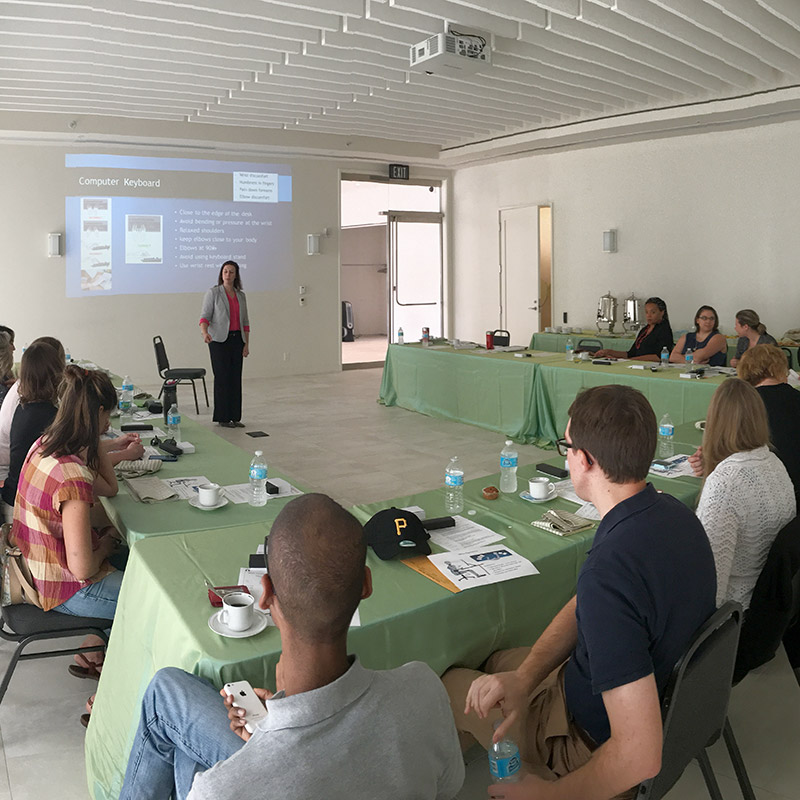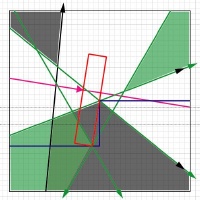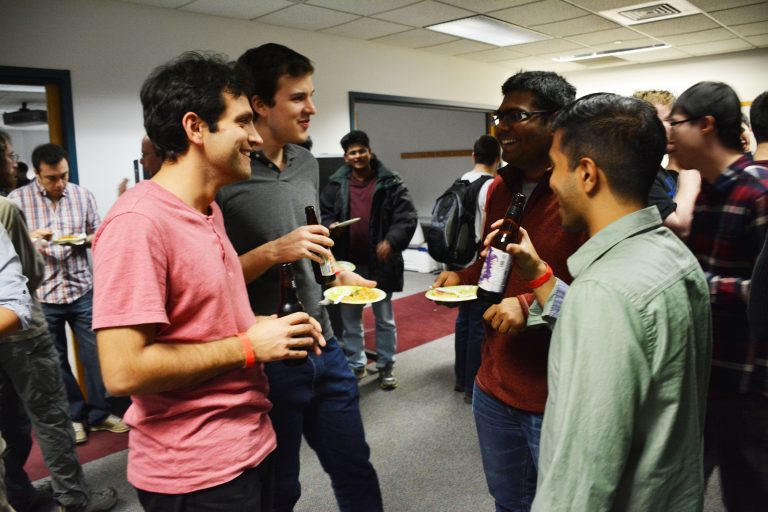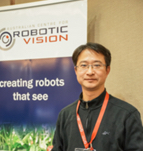Robotics Institute Administrative Support Staff Monthly Lunch Meeting
By Invitation Only - All Robotics Institute administrative support staff are invited to join us for our monthly lunch meeting. Speaker/topic to be announced.
Robotics Institute Faculty Lunch
By Invitation Only - Robotics Institute Faculty Lunch - Please arrive by 11:45AM, talk will begin promptly at 12:00PM.
David Held: Robots Learning to Understand Environmental Changes
Abstract Robots today are typically confined to operate in relatively simple, controlled environments. One reason for these limitation is that current methods for robotic perception and control tend to break down when faced with occlusions, viewpoint changes, poor lighting, unmodeled dynamics, and other challenging but common situations that occur when robots are placed in the [...]
Software Development for Robotic Systems: some ideas about how to improve it
Event Location: NSH 1507Bio: Silvio joined the FRC group in 2012 and since then worked with several unmanned ground and aerial vehicles doing a lot of systems integration, testing and performance improvements. Before joining the FRC, he worked for several consumer electronics industries for more than 10 years developing embedded software using both conventional and [...]
Fusion of Cameras and Sparse Ranging Measurements in Multi‐agent SLAM
Abstract Cameras are widely used for localization and navigation in GNSS‐denied environments. By exploiting VSLAM (Visual Simultaneous Localization and Mapping) techniques, vehicles equipped with cameras are capable of estimating their own trajectories and simultaneously building a map of the surrounding environment. In many applications, multiple cooperative robotic agents (robotic swarms) are used in order to [...]
Toward Natural Interactions With Assistive Robots
Abstract Robots can help people live better lives by assisting them with the complex tasks involved in everyday activities. This is especially impactful for people with disabilities, who can benefit from robotic assistance to increase their independence. For example, physically assistive robots can collaborate with people in preparing a meal, enabling people with motor impairments [...]
Carnegie Mellon University
Compact Generative Models of Point Cloud Data for 3D Perception
Abstract: One of the most fundamental tasks for any robotics application is the ability to adequately assimilate and respond to incoming sensor data. In the case of 3D range sensing, modern-day sensors generate massive quantities of point cloud data that strain available computational resources. Dealing with large quantities of unevenly sampled 3D point data is [...]
Carnegie Mellon University
Mathematical Models of Adaptation in Human-Robot Collaboration
Abstract: While much work in human-robot interaction has focused on leader- follower teamwork models, the recent advancement of robotic systems that have access to vast amounts of information suggests the need for robots that take into account the quality of the human decision making and actively guide people towards better ways of doing their task. [...]
Multi-class Boosting in Computer Vision
Abstract: Boosting classifiers have been extensively used for learning multi-view single objects detectors (e.g. faces, cars or pedestrians) or in multiple object categories detectors. Object detection has been evolving from being specific for a given object category to multi-view or even being able to detect multiple categories at the same time. The usual framework for [...]
On-Demand Machine Knitting for Everyone
Abstract: Knitting machines are general-purpose fabrication devices that can robustly create intricate 3D surfaces from yarn by cleverly actuating thousands of mechanical needles. Knitting machines are an established feature of the textiles production landscape, in use today to make everything from socks to sweaters. However, the current design tools for machine knitting are sorely lacking [...]
The Critical Radius in Sampling-Based Motion Planning
Abstract ------------ Motion planning is a fundamental problem in robotics: allowing autonomous robots to efficiently navigate in environments cluttered with obstacles. Sampling-based algorithms, which were first described two decades ago, have made a great impact on the field of robotics by providing simple but highly-effective tools for motion planning. These techniques aim to capture the [...]
Staff Lunch
By Invitation Only - All Robotics Institute administrative support staff are invited to join us for our monthly lunch meeting. Cheryl will provide a brief update on the team reorganization.
Terrestrial and Extraterrestrial Robotics in the Age of Autonomy
Liam Pedersen leads the autonomous vehicle group at Nissan’s Research Center in Silicon Valley, focusing on the AI software for driverless operations in urban areas. Prior to this he worked on robotic systems for planetary exploration at NASA’s Ames Research Center in California. He holds a Ph.D. in robotics from Carnegie Mellon University, and is the recipient [...]
AI, Robotics, and Autonomous Vehicle Development at Ford Motor Company
Notice: The Location for these event has changed! The event will now take place in 6115 Gates Hillman Center. Education: Ph.D. in Physics, University of Michigan M.S. in Physics, Michigan State University B.S. in Physics & Mathematics, University of Wisconsin – River Falls Abstract: This presentation will highlight the history of autonomous vehicle development at [...]
Carnegie Mellon University
Learning to learn from simulation: Using simulations to expedite learning on robots
Abstract: Robot controllers, including locomotion controllers, often consist of expert-designed heuristics. These heuristics can be hard to tune, particularly in higher dimensions. It is typical to use simulation to tune or learn these parameters and test on hardware. However, controllers learned in simulation often don't transfer to hardware due to model mismatch. This necessitates controller [...]
Fun with Fluids
Abstract: Visual simulation of fluids has become an indispensable tool for computer graphics. Many fluid phenomena can be simulated by solving Navier-Stokes equations. In computer graphics, the NS equations are mostly used for simulating smoke, water and fire. However, it is useful for other different purposes. In this talk, we show our usage of [...]
Carnegie Mellon University
Training Strategies for Time Series: Learning for Prediction, Filtering, and Reinforcement Learning
Abstract: Data driven approaches to modeling time-series are important in a variety of applications from market prediction in economics to the simulation of robotic systems. However, traditional supervised machine learning techniques designed for i.i.d. data often perform poorly on these sequential problems. This thesis proposes that time series and sequential prediction, whether for forecasting, filtering, [...]
Panel Discussion: “Robotics, Pittsburgh and the End of Work”
As one of the test sites for Uber’s driverless cars, Pittsburgh is frequently hailed as a city of the future. And indeed, some economists predict that robots will outnumber human workers as early as 2040. At this panel will talk about how we can plan for this seismic change in our economy and way of [...]
Dinner Reception: “Robotics, Pittsburgh and the End of Work”
After the “Robotics, Pittsburgh and the End of Work” talk, head over the lounge outside of the Giant Eagle auditorium, A51 Baker Hall, for a dinner reception from 6-7 pm.
“Love Your Work”
Kathi Weeks is Professor of Women’s Studies at Duke University and writes about the intersection of feminism and labor. In her talk about anti-work politics in the age of “love your work,” Weeks Livingston argues for a Universal Basic Income (UBI) and a future in which we leave the Protestant work ethic behind.
Robotics Institute Faculty Lunch
By Invitation Only - Robotics Institute Faculty Lunch - Please arrive by 11:45AM, talk will begin promptly at 12:00PM.
Carnegie Mellon University
Expressive Real-time Intersection Scheduling
Abstract: Traffic congestion is a major annoyance throughout global metropolitan areas. This talk will present Expressive Real-time Intersection Scheduling (ERIS), a schedule-driven control strategy for adaptive intersection control to reduce traffic congestion. ERIS maintains separate estimates for each lane approaching a traffic intersection allowing it to more accurately estimate the effects of scheduling decisions than [...]
Challenges Facing Computational Face
Abstract: Recent advances in computational face research make possible a growing range of scientific, behavioral, and commercial applications. Many companies are focusing on the future of computational face products and services, but number of critical research questions remain to be solved. These include 3D face alignment from 2D image, face analysis under extreme pose variation [...]
Modeling Human Movements for Robotics
Abstract: Creating realistic virtual humans has traditionally been considered a research problem in Computer Animation primarily for entertainment applications. With the recent breakthrough in collaborative robots and deep reinforcement learning, accurately modeling human movements and behaviors has become a common challenge faced by researchers in robotics, artificial intelligence, as well as Computer Animation. In this [...]
Don’t forget to have fun
Abstract: I like to think that robots should be rational agents, modeled on human behavior. I teach a course about using optimization to plan over time by maximizing utility. I note that a series of Nobel Prizes in Economics, starting with CMU's own AI pioneer Herb Simon and including one to Daniel Kahneman and this [...]
RoboOrg Board Games
Board game night in RoboLounge with pizza and soda! We will be playing a bunch of games including Settlers of Catan, Codenames, Coup, Reformation and more!
What Matters for Deformable Object Manipulation
Abstract: Deformable objects such as cables and clothes are ubiquitous in factories, hospitals, and homes. While a great deal of work has investigated the manipulation of rigid objects in these settings, manipulation of deformable objects remains under-explored. The problem is indeed challenging, as these objects are not straightforward to model and have infinite-dimensional configuration spaces, [...]
RoboOrg FIFA 17 Tournament
Kicking off (pun intended) RoboOrg video game tournaments with FIFA 17, food and sodas! Sign up at this link or just show up the day of. Bring a healthy competitive spirit because we have some serious players!
Carnegie Mellon University
Scaling up Self Supervised Robot Learning
Abstract Robot learning holds promise in alleviating several real world problems, by performing complex behaviors in complex environments. But what is the right way to train these robots? Our methods on self supervision shows encouraging results on several tasks like grasping objects, pushing objects and even flying drones. One key challenge with these methods is [...]
Bayesian Eigenobjects: A Unified Framework for 3D Robot Perception
Abstract: Robot-object interaction requires several key perceptual building blocks including object pose estimation, object classification, and partial-object completion. These tasks form the perceptual foundation for many higher level operations including object manipulation and world-state estimation. Most existing approaches to these problems in the context of 3D robot perception assume an existing database of objects [...]
Carnegie Mellon University
Planning for a Small Team of Heterogeneous Robots: from Collaborative Exploration to Collaborative Localization
Abstract: Robots have become increasingly adept at performing a wide variety of tasks in the world. However, many of these tasks can benefit tremendously from having more than a single robot simultaneously working on the problem. Multiple robots can aid in a search and rescue mission each scouting a subsection of the entire area in [...]
Staff Lunch
By Invitation Only - All Robotics Institute administrative support staff are invited to join us for our monthly lunch meeting. Speaker/topic to be announced.
Two Tales about Image Classification
Abstract: This talk tells two tales about image-classification systems, both of which are motivated by the real-world deployment of such systems. The first tale introduces a new convolutional neural network architecture, called multi-scale DenseNets, with the ability to adapt dynamically to computational resource limits at inference time. The network uses progressively growing multi-scale convolutions, dense [...]
Optimizing ankle prostheses to improve walking in transtibial amputees
Abstract: With a prosthetic device, people with a lower limb amputation can remain physically active, but most do not achieve medically recommended physical activity standards and are therefore at a greater risk of obesity and cardiovascular disease. Their reduced activity may be attributed to the 10 - 30% increase in energetic cost during walking compared [...]
RoboOrg Post-Seminar Reception
Join us after Deanna Gates' RI Seminar in RoboLounge and adjoining Newell-Simon Hall 1507 to socialise with the speaker and other member's of the RI community. There will be food and drinks for all! PSRs are a good time to let off some steam, meet new people, have engaging conversations, learn new things and most [...]
Dense 3D Shape Reconstruction of Complex Dynamic Scene with a Single Monocular Camera
Abstract: In this talk, I will describe our recent work (presented at ICCV 2017) on monocular camera based 3D geometry reconstruction of a non-rigid dynamic scene. We aim to answer an open question in multi-view geometry, namely, "Is it possible to recover the 3D structure of a complex dynamic environment from two image frames captured by [...]
Learning to Visually Reason
Abstract: Visual reasoning is a core capability of artificial intelligence. It is a necessity for effective communication, planning, and for question/answering tasks. In this talk, I discuss some recent explorations into visual reasoning for question/answering, game playing and dialog. I also describe our new reinforcement learning platform ELF; an Extensive, Lightweight and Flexible research platform [...]
Carnegie Mellon University
Data Collection for Screwdriving
Abstract: As the use of robotic manipulation in manufacturing continues to increase, the robustness requirements for fastening operations such as screwdriving increase as well. To investigate the reliability of screwdriving and the diverse failure categories that can arise, we collected a dataset of screwdriving operations and manually classified them into stages and result categories. I [...]































